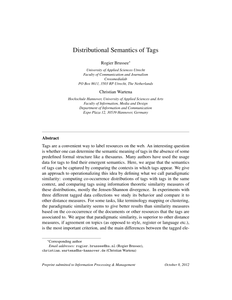The role and ethics of professionals in business and economics have been questioned, especially after the financial crisis of 2008. Some suggest a reorientation using concepts such as craftsmanship. In this article, I will explore professional practices within the context of behavioural theory and business ethics. I suggest that scholars of behavioural theory need a strategy to deal with normative questions to meet their ambition of practical relevance. Evidence-based management (EBMgt), a recent behavioural approach, may assist business ethics scholars in understanding how professionals infer ‘evidence’ to make decisions. For a professional, ethical issues are an integral part of decision-making at critical moments. As reflective practitioners, they develop insights related to ethical concerns when collecting and assessing evidence within decision-making processes.
DOCUMENT

Reading a novel about a dying person and the people attending the dying, one can not only reflect upon the moral involvement between the literary characters depicted, but also upon the way in which the reader takes the position of a “bystander” in this scene. In two novels, The Death of Ivan Ilyich by Tolstoy and The Big Ward by the Dutch author Jacoba van Velde, this moral involvement can be interpreted as a form of “compassion”. Martha Nussbaum’s concept of “compassionate imagination” offers a perspective on the way in which the reader can be involved in this literary depiction of the dying. However, the Aristotelian criteria that Nussbaum proposes for the rational judgement of compassion and her ambitions that literature can “raise society’s floor” by developing “compassionate imagination” in readers, are difficult to apply to these specific cases. In comparing both novels, it is exactly the differences between them – the historical context and social classes depicted - that bring to light a problematic presupposition in Nussbaum, namely the a-historical universality in the compassionate involvement. A re-interpretation of one of the Aristotelian criteria for compassion leaves room for a “compassionate imagination” not based on a rational judgement but on a sense of shared vulnerability that is precisely evoked by the literary depiction of the dying.
LINK
Preprint submitted to Information Processing & Management Tags are a convenient way to label resources on the web. An interesting question is whether one can determine the semantic meaning of tags in the absence of some predefined formal structure like a thesaurus. Many authors have used the usage data for tags to find their emergent semantics. Here, we argue that the semantics of tags can be captured by comparing the contexts in which tags appear. We give an approach to operationalizing this idea by defining what we call paradigmatic similarity: computing co-occurrence distributions of tags with tags in the same context, and comparing tags using information theoretic similarity measures of these distributions, mostly the Jensen-Shannon divergence. In experiments with three different tagged data collections we study its behavior and compare it to other distance measures. For some tasks, like terminology mapping or clustering, the paradigmatic similarity seems to give better results than similarity measures based on the co-occurrence of the documents or other resources that the tags are associated to. We argue that paradigmatic similarity, is superior to other distance measures, if agreement on topics (as opposed to style, register or language etc.), is the most important criterion, and the main differences between the tagged elements in the data set correspond to different topics
DOCUMENT

Participatory sport events have been recently proposed as one of the strategies to promote physical activity participation, because of the “sport participation effect”.Active participation in sport events (and the training which participants complete prior to this event) can increase physical activity of both active and inactive individuals. To propose strategies for promoting running events among the public (citizens) in order to motivate them to participate in such events.Partners:Aristotle University of Thessaloniki (Greece), Mulier Instituut (Netherlands), KU Leuven (Belgium), Lithuanian Sports University (Lithuania), ECOS (Italy) and the European Association of Sports Management